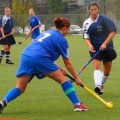Steve: I don't see it the same as the women's thing. I just think people should, who are running whatever association, like we should reduce the number of situations where we legislate to people according to some high principle of human rights that this is what you must do. Women's fitness clubs, fine. NHL doesn't want to have women in there for whatever reason, fine. Mark: Not that they said that, they don't want to get in trouble. Steve: No, no. The same with the golf, like if they had an open division because there is the reciprocity issue. If you say that women can compete, you talk about rights, ok? Unions operate on the basis of seniority, so here I am, I'm a young worker. I've got a family. I'm struggling to feed my family. A job comes up at the Mill or whatever work place. The first person who gets a chance at that is the person with more seniority. I'm better, why him? I've got 3 kids to support, he's a bachelor. Why? Because that's how it's been set up. To my mind you can't go challenging everything based on human rights. And, if you do go to the human rights angle, everybody is equal, everything should be fair then there are some consequences. So you say, ok. The women can play in the men's league and the men should be able to play in the women's league. So what have you got now? Basically you eliminate 90% of the women's opportunities. Sean: Then there should be all kinds of things. There should be women only, men only and mixed leagues. People don't want it to go with both, they have that opportunity. Steve: You can take and organize a league but someone's got to organize a league. You can't go to court and say there should be a league for me. Sean: That I can agree with totally.
Steve: That's all I'm saying, that once you make is a human rights issue?. Sean: People are coming at it the wrong angle. If you don't like it make your own. Steve: I mean we have mixed slow pitch. It's social. People love it. People should be free to do whatever they want to do within reason to amuse themselves without the heavy hand of human rights.
Mark: They've got men's only slow pitch and they have mixed slow pitch. I don't know if they have women's slow pitch. Steve: I know they have women's soft ball, bat ball. Anyway, we didn't really cover the World Cup or the Stanley Cup. We had a very interesting discussion. It will be interesting to see what our listeners out there have to say.
But, one thing I should say is the Stanley Cup, and what is interesting in the Stanley Cup is we have people from many different countries playing on the different teams in the NHL, not just Canadian. People from primarily Europe and North America, but that's not to say in the future? Mark played in Japan. There's some very good hockey players in Japan and in Korea and China. We have seen the Japanese and Korean, I think some Taiwanese baseball players playing in the U.S. We have .
Mark: South Americans.
Steve: ?in baseball. In basketball we have Africans, we have Europeans, we have Chinese players in the pros. And, of course the World Cup of soccer, the wonderful spectacle where you see people from different continents, different countries and you know not fighting with weapons but competing on the sports field. So I think sports is a great area of human activity, but it does raise some interesting issues.

